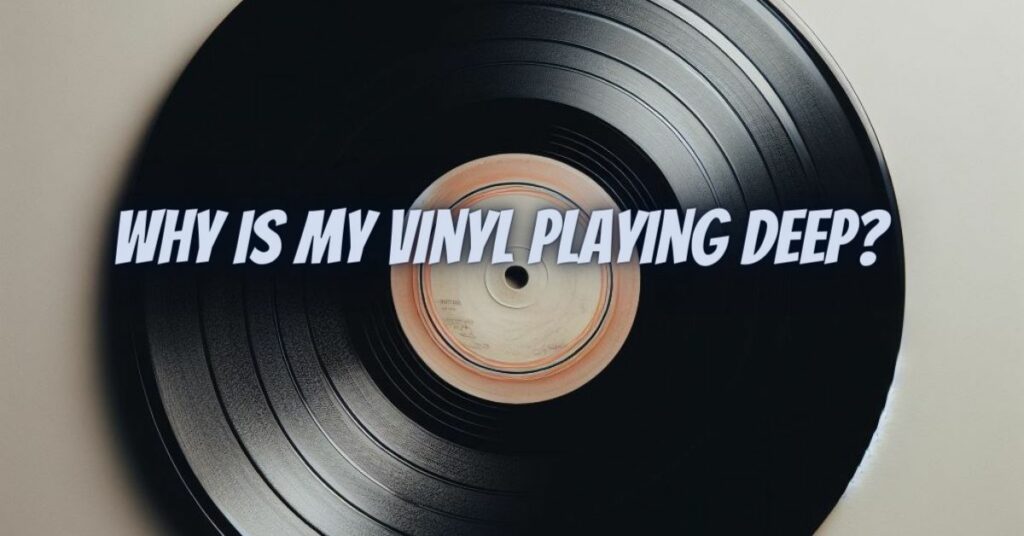Vinyl records have made an impressive comeback in recent years, captivating music enthusiasts with their analog charm and sonic warmth. However, vinyl playback can occasionally present challenges, and one of the perplexing issues that listeners encounter is a vinyl record playing with a deep sound. In this comprehensive guide, we will explore the common causes behind this phenomenon, offering insights into what might be causing your vinyl to play with a deep, low-pitched quality, and how to address these issues to restore the intended audio experience.
Understanding the Anatomy of Vinyl Records
Before diving into the reasons why vinyl records may play with a deep sound, it’s essential to grasp the fundamentals of vinyl record construction and playback:
- Grooves and Groove Depth:
- Vinyl records store audio information in grooves that spiral from the center to the edge. The depth and width of these grooves vary to represent different audio frequencies.
- Playback Speeds:
- Vinyl records are designed to be played at specific speeds, with the most common being 33 1/3 RPM (revolutions per minute) for LPs (Long Play) and 45 RPM for singles.
- Stylus and Tonearm:
- The stylus (needle) of your turntable’s tonearm tracks these grooves, translating the physical grooves into audible sound through a speaker system.
Common Causes of Vinyl Playing with a Deep Sound
When your vinyl record plays with a deep, low-pitched sound, several factors may be at play:
- Incorrect Speed Setting:
- The most frequent reason for deep playback is an incorrect turntable speed setting. If your turntable is set to the wrong speed (e.g., 33 RPM instead of 45 RPM), the record will play at a slower speed, resulting in a lower pitch.
- Belt Drive Issues:
- Turntables with belt-driven mechanisms can experience problems with the drive belt. A loose or worn-out belt can cause speed inconsistencies, leading to deep playback.
- Motor Malfunctions:
- The turntable’s motor is responsible for maintaining consistent playback speed. Motor malfunctions or wear and tear can result in irregularities, leading to pitch variations.
- Pitch Control Problems:
- Turntables equipped with pitch control sliders or knobs may experience calibration issues. An improperly calibrated pitch control can alter playback speed and pitch.
- Vinyl Warping:
- Warped vinyl records can affect playback speed, causing the stylus to encounter deformities in the groove and leading to fluctuations in pitch and audio quality.
Troubleshooting and Solutions
To address the issue of your vinyl playing with a deep sound, consider the following troubleshooting steps:
- Check Speed Settings:
- Verify that your turntable is set to the correct speed (33 RPM or 45 RPM) based on the type of record you are playing. Refer to your turntable’s user manual for guidance on adjusting the speed.
- Inspect Drive Belt:
- For belt-driven turntables, ensure that the drive belt is properly seated and has the correct tension. Over time, belts can stretch or degrade, so consider replacing them if necessary.
- Calibrate Pitch Control:
- If your turntable features pitch control, ensure it is accurately calibrated. Use a strobe disc or app to fine-tune the pitch to the correct speed.
- Maintenance and Cleaning:
- Regularly clean and maintain your turntable to prevent motor issues and ensure smooth playback. Dust and debris can affect the performance of the turntable.
- Check for Vinyl Warping:
- Visually inspect your vinyl records for warping. If you discover warps, consider using a vinyl flattening device or replacing damaged records.
The allure of vinyl records lies not only in their sonic quality but also in the tactile experience of handling physical media. When your vinyl plays with a deep, low-pitched sound, it can be perplexing, but it is a challenge with practical solutions. By ensuring that your turntable is correctly configured, well-maintained, and free from mechanical issues, you can restore the intended audio experience of your vinyl records.
Troubleshooting and resolving playback issues can enhance your vinyl listening experience and allow you to enjoy the nuances of your favorite music with clarity and fidelity. Whether you are a seasoned vinyl enthusiast or a newcomer to the world of analog sound, understanding the causes behind deep playback is essential for maintaining the integrity of your vinyl collection.


